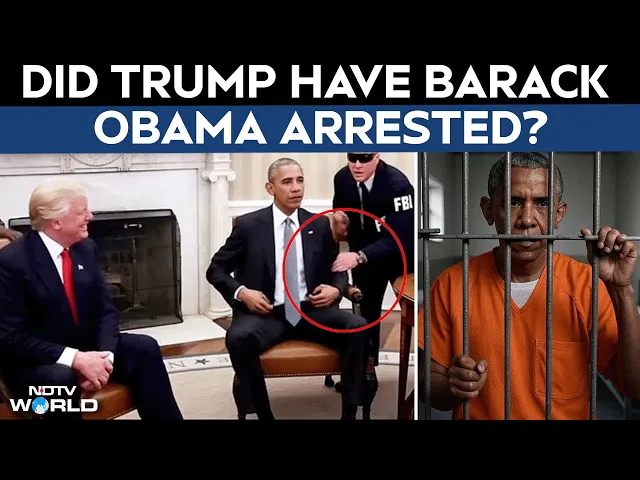Obama AI Video | Trump Shares Video Of Barack Obama Getting Arrested, But There’s A Catch To It

AI deepfakes threaten 2024 election integrity
In a digital landscape where seeing is no longer believing, we've entered a new era of political manipulation through AI-generated content. A recent incident involving former President Trump sharing a deepfake video depicting Barack Obama being arrested highlights the growing sophistication and mainstream deployment of AI-generated misinformation. This troubling development signals what may become the defining challenge of the 2024 election cycle.
What happened and why it matters
-
Political figures are now actively deploying AI deepfakes – When a former president shares manipulated content to millions of followers, we've crossed a threshold where AI deception has moved from fringe concern to mainstream political tactic.
-
Detection technology remains inadequate – Current deepfake detection tools and platforms' content moderation policies have proven insufficient to prevent the rapid spread of convincing fake content across social media.
-
Legal and regulatory frameworks lag significantly behind – Despite the clear danger AI-generated misinformation poses to democratic processes, comprehensive legislation specifically addressing political deepfakes remains largely absent.
-
Voter literacy on AI manipulation is dangerously low – Most Americans lack the awareness or tools to critically evaluate increasingly sophisticated AI-generated content, creating vulnerability to manipulation.
The bigger picture: Democracy in the age of AI
The most concerning aspect of this incident isn't just that the technology exists, but that we've now seen its deployment by major political figures themselves. This represents a fundamental shift in our information ecosystem. While concerns about misinformation have existed for years, AI-generated content creates an entirely new category of threat that combines perfect visual mimicry with algorithmic distribution at unprecedented scale.
Previous eras of political misinformation required significant resources to produce and distribute. Today's AI tools democratize deception, allowing anyone with basic technical skills to generate convincing fake videos, voice clips, or images in minutes. When these capabilities intersect with social media algorithms optimized for engagement rather than accuracy, we face the perfect conditions for widespread manipulation.
The incident also demonstrates the collapse of institutional gatekeeping that once provided some buffer against outright fabrications. When a presidential candidate shares demonstrably fake content, they bypass traditional media filters entirely, speaking directly to supporters through platforms that lack effective verification mechanisms.
What business leaders should understand
For business leaders, this isn't merely
Recent Videos
How To Earn MONEY With Images (No Bullsh*t)
Smart earnings from your image collection In today's digital economy, passive income streams have become increasingly accessible to creators with various skill sets. A recent YouTube video cuts through the hype to explore legitimate ways photographers, designers, and even casual smartphone users can monetize their image collections. The strategies outlined don't rely on unrealistic promises or complicated schemes—instead, they focus on established marketplaces with proven revenue potential for image creators. Key Points Stock photography platforms like Shutterstock, Adobe Stock, and Getty Images remain viable income sources when you understand their specific requirements and optimize your submissions accordingly. Specialized marketplaces focusing...
Oct 3, 2025New SHAPE SHIFTING AI Robot Is Freaking People Out
Liquid robots will change everything In the quiet labs of Carnegie Mellon University, scientists have created something that feels plucked from science fiction—a magnetic slime robot that can transform between liquid and solid states, slipping through tight spaces before reassembling on the other side. This technology, showcased in a recent YouTube video, represents a significant leap beyond traditional robotics into a realm where machines mimic not just animal movements, but their fundamental physical properties. While the internet might be buzzing with dystopian concerns about "shape-shifting terminators," the reality offers far more promising applications that could revolutionize medicine, rescue operations, and...
Oct 3, 2025How To Do Homeless AI Tiktok Trend (Tiktok Homeless AI Tutorial)
AI homeless trend raises ethical concerns In an era where social media trends evolve faster than we can comprehend them, TikTok's "homeless AI" trend has sparked both creative engagement and serious ethical questions. The trend, which involves using AI to transform ordinary photos into images depicting homelessness, has rapidly gained traction across the platform, with creators eagerly jumping on board to showcase their digital transformations. While the technical process is relatively straightforward, the implications of digitally "becoming homeless" for entertainment deserve careful consideration. The video tutorial provides a step-by-step guide on creating these AI-generated images, explaining how users can transform...
